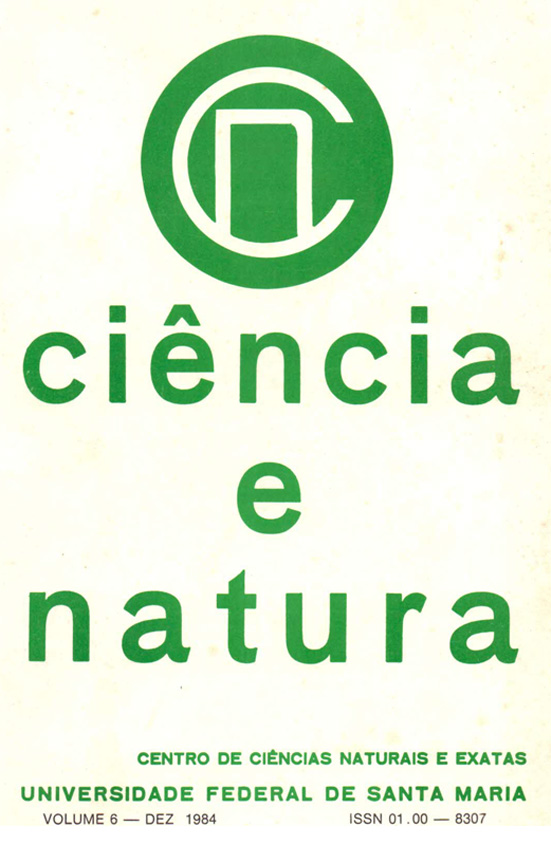Dormancy of the seeds species and 3 varieties of the genera Stylosanthes (Leguminosae-Papilionoideae)
DOI:
https://doi.org/10.5902/2179460X25316Abstract
Seeds of S. capitata Vog., S. macrocephala M.B. Ferr. et S. Costa, S. scabra Vog., S. grandifolia M.B. Ferr. et S. Costa, S. humilis H.B.K., S. gracilis H.B.K., S. viscosa Sw. and s. guianensis (Aubl. ) Sw. varieties: microcephala M.B. Ferr. et S. Costa, canescens M.B. Ferr. et S. Costa and vulgaris M.B. Ferr. et S. Costa were utilized in 3 experiments of laboratory to determine the percentage of dormancy and index of germination considering only the temperature factor. A high degree of dormancy was evidenced in the results, refleted in a low index of germination.Downloads
References
BARRIGA, J.P. Autoecologia de Stylosanthes humilis H.B.K.: avaliação da variabilidade morfológica e estudos da biologia da semente. Piracicaba - SP. Dissertação de Mestrado. ESALQ/USP.1979, 97 p.
CAMERON, D.F. Herdseednes and dormency of Townsville Lucerne (Stylosanthes humilis H.B.K.) selections. Australian Journal of Experimental Agriculture and animal Husbandry, 7: 237-248, 1967a.
PATERNIANI, M.L.S. e MARTINS, P.S. Variabilidade Genética da dormência de sementes em populações de Stylosanthes guianensis (Aubl.) Sw. (Leguminosae-Papilionoideae). In: Relatório Científico. ESALQ/USP. Depto. de Genética. Anais, 13: 226-234, 1979.
ROLSTON, M.P. Water impermeable seed dormency. The Botanical Review,
: 365-396, 1978.
SERPA, A. Alguns fatores que afetam a velocidade inicial de crescimento em Centrosema sp. In: Reunião da Sociedade Brasileira de Zootecnia, XLLIª, Salvador, 13: 316-318; 1976.
TULEY, P. Stylosanthes gracilis. Herbaqe Abstracts. Farham Royal, 38: 87-94, 1968.
Downloads
Published
How to Cite
Issue
Section
License
To access the DECLARATION AND TRANSFER OF COPYRIGHT AUTHOR’S DECLARATION AND COPYRIGHT LICENSE click here.
Ethical Guidelines for Journal Publication
The Ciência e Natura journal is committed to ensuring ethics in publication and quality of articles.
Conformance to standards of ethical behavior is therefore expected of all parties involved: Authors, Editors, Reviewers, and the Publisher.
In particular,
Authors: Authors should present an objective discussion of the significance of research work as well as sufficient detail and references to permit others to replicate the experiments. Fraudulent or knowingly inaccurate statements constitute unethical behavior and are unacceptable. Review Articles should also be objective, comprehensive, and accurate accounts of the state of the art. The Authors should ensure that their work is entirely original works, and if the work and/or words of others have been used, this has been appropriately acknowledged. Plagiarism in all its forms constitutes unethical publishing behavior and is unacceptable. Submitting the same manuscript to more than one journal concurrently constitutes unethical publishing behavior and is unacceptable. Authors should not submit articles describing essentially the same research to more than one journal. The corresponding Author should ensure that there is a full consensus of all Co-authors in approving the final version of the paper and its submission for publication.
Editors: Editors should evaluate manuscripts exclusively on the basis of their academic merit. An Editor must not use unpublished information in the editor's own research without the express written consent of the Author. Editors should take reasonable responsive measures when ethical complaints have been presented concerning a submitted manuscript or published paper.
Reviewers: Any manuscripts received for review must be treated as confidential documents. Privileged information or ideas obtained through peer review must be kept confidential and not used for personal advantage. Reviewers should be conducted objectively, and observations should be formulated clearly with supporting arguments, so that Authors can use them for improving the paper. Any selected Reviewer who feels unqualified to review the research reported in a manuscript or knows that its prompt review will be impossible should notify the Editor and excuse himself from the review process. Reviewers should not consider manuscripts in which they have conflicts of interest resulting from competitive, collaborative, or other relationships or connections with any of the authors, companies, or institutions connected to the papers.






